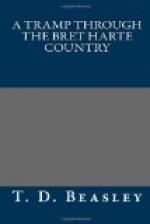Auburn marks the western verge of the mineral zone, but in the fifties there were, rich placer diggings in the immediate vicinity. There are some remarkably solid buildings of that period, in the old portion of the town, which, as customary, is situated in the bottom of the winding valley or ravine. Practically a new town, called “East Auburn,” has been started on higher ground, and a fight is on to move the post office; but the people in the hollow having the voting strength, hang on to it like grim death. Along the edge of the American River canon and commanding a magnificent view, are the homes of the local aristocracy. In christening Auburn, it is scarcely credible that the pioneers had in mind Goldsmith’s “loveliest village of the Plain;” nor, keeping the old town in view, is the title remarkably applicable today.
Our next objective point being Colfax, distant in a north-easterly direction only fifteen miles, we made a leisurely inspection of the town and vicinity in the morning. The old town proved of absorbing interest to my friend, and we became separated while be was hunting up subjects for the camera. Having a free and easy working scheme in such matters, after a few minutes’ search, I gave up the quest and started alone on the road to Colfax.
A few miles out, I met a man with a rifle on his shoulder, leading a burro bearing a pack-saddle laden in the most scientific manner with probably all his worldly possessions, the pick and shovel plainly denoting a prospector. A water bucket on one side of the animal was so adjusted that the bottom was uppermost; on the top of the bucket sat a little fox-terrier, his eyes fixed steadfastly on his master. I paused a moment, possessed with a strong desire to take a snap shot of this remarkable equipment, but the man with the gun gave me a glance that settled the matter. His was not a bad face — far from it — but the features were stern and set, the cheeks furrowed with deep lines that bespoke hardship and fatigue in the struggle with Nature and the elements. That glance out of the tail of his eye meant: “Let me alone and I will let you alone, but let me alone!”
Taciturnity becomes habitual to men accustomed to vast solitudes. Even on such a tramp as I had undertaken, in which I frequently walked for miles without sight or sound of a human being, I began to realize how banal and aimless is conventional conversation. Under such conditions you feel yourself in sympathy with the man who says nothing unless he has something to say, and who, in turn, expects the same restriction of speech from you.




